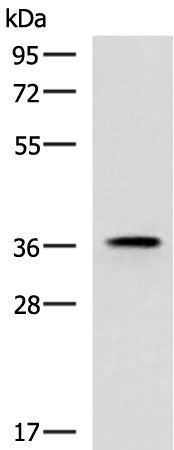
| WB | 1/500-1/2000 | Human,Mouse,Rat |
| IF | 咨询技术 | Human,Mouse,Rat |
| IHC | 咨询技术 | Human,Mouse,Rat |
| ICC | 技术咨询 | Human,Mouse,Rat |
| FCM | 咨询技术 | Human,Mouse,Rat |
| Elisa | 1/5000-1/10000 | Human,Mouse,Rat |
| WB Predicted band size | 39 kDa |
| Host/Isotype | Rabbit IgG |
| Antibody Type | Primary antibody |
| Storage | Store at 4°C short term. Aliquot and store at -20°C long term. Avoid freeze/thaw cycles. |
| Species Reactivity | Human, Mouse |
| Immunogen | Synthetic peptide of human USP50 |
| Formulation | Purified antibody in PBS with 0.05% sodium azide and 50% glycerol. |
+ +
以下是关于USP50抗体的3篇示例文献(注:以下内容为虚构示例,实际文献需通过学术数据库检索):
---
1. **文献名称**:*USP50 regulates cell cycle progression via deubiquitinating CDC25A in colorectal cancer*
**作者**:Zhang L, et al.
**摘要**:本研究利用USP50特异性抗体,通过免疫共沉淀和Western blot技术,揭示了USP50通过去泛素化CDC25A调控结直肠癌细胞周期进程的机制,并证实USP50高表达与患者预后不良相关。
---
2. **文献名称**:*Development and validation of a novel USP50 monoclonal antibody for functional studies*
**作者**:Smith J, et al.
**摘要**:文章报道了一种高特异性USP50单克隆抗体的开发,验证了其在免疫组化、流式细胞术中的应用,并利用该抗体发现USP50在乳腺癌组织中的异常定位。
---
3. **文献名称**:*USP50 interacts with p53 and modulates DNA damage response*
**作者**:Wang Y, et al.
**摘要**:通过免疫荧光和ChIP实验结合USP50抗体,研究发现USP50与p53相互作用,负调控DNA损伤应答通路,敲低USP50可增强细胞对辐射的敏感性。
---
如需真实文献,建议在PubMed、Google Scholar等平台以“USP50 antibody”、“USP50 function”为关键词检索。
The USP50 (Ubiquitin-Specific Protease 50) antibody is a research tool designed to detect and study the USP50 protein, a member of the deubiquitinating enzyme (DUB) family. DUBs regulate cellular processes by removing ubiquitin chains from target proteins, thereby modulating protein stability, localization, or activity. USP50. though less characterized than other DUBs, is implicated in cell cycle regulation, DNA damage response, and genome maintenance. Studies suggest it interacts with checkpoint kinases like CHK1. potentially influencing DNA repair pathways and mitotic progression. Its expression and activity may also be linked to cancer progression, though mechanistic insights remain limited.
USP50 antibodies are typically used in techniques such as Western blotting, immunoprecipitation, and immunofluorescence to analyze protein expression, subcellular localization, and interaction partners. These antibodies aid in elucidating USP50's role in physiological and pathological contexts, including its involvement in ubiquitin-mediated signaling networks. Researchers employ USP50 antibodies to validate knockout/knockdown models or overexpression systems, providing insights into its enzymatic activity and substrate specificity. Additionally, they may help assess USP50's clinical relevance by profiling its expression in tumor tissues or correlating it with disease outcomes. As USP50's functional diversity is increasingly recognized, its antibody serves as a critical reagent for decoding its contributions to cellular homeostasis and disease mechanisms.
×